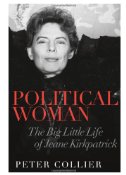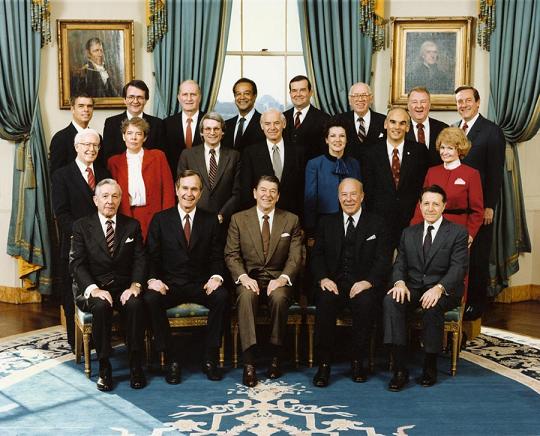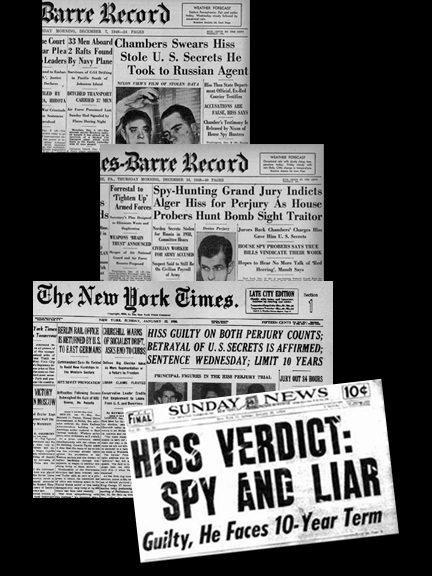
Political Woman The Big Little Life of Jeane Kirkpatrick By Peter Collier
 Political Woman
Political Woman
The Big Little Life of Jeane Kirkpatrick
By Peter Collier
This first and only biography of Jeane Kirkpatrick almost wasn’t written. Those interested in understanding US political history over the last 50 years can be grateful that it was. Jeane Kirkpatrick’s evolution from liberal (before the word became a pejorative) Democrat to Reagan Republican is also the story of how the radical left hijacked the Democratic Party, the winning of the Cold War, and an account of a group of individuals whose collective brainpower could move a planet out of orbit.
But for Kirkpatrick fans, (in the interest of full disclosure, this reviewer is one) it is first and foremost the story of a remarkable woman whose keen intelligence and stubborn truth seeking guided her life. With a fervor born of her small town Middle America roots, she profoundly influenced the nation she unreservedly loved.
The author and Kirkpatrick began their association by arguing over his insistence that she write her autobiography. She had, in fact, attempted to do so shortly after leaving the Reagan administration in 1985, but found it an impossible task. She was an intensely private person who thought her personal life was nobody else’s business. Finally, an agreement was reached. Collier would do the groundwork, interviewing Jeane when their schedules permitted, and then turn the manuscript over to her for editing and elaboration.
As the years went by and age and illness overtook her, Jeane admitted that the book would never be completed. The author said, that being the case, he might just have to “go ahead and write it myself.â€Â She thought a moment and replied, “Well, maybe you should.â€
 That’s where matters stood until after her death when Collier started to think of his off-hand comment as a promise. Drawing on Jeane’s unfinished autobiography, the recollections of friends and family, her published and unpublished papers and the interviews, this book was written. The author’s admiration for his subject, however, does not cross over into hagiography. He does not downplay her foibles and weaknesses.
That’s where matters stood until after her death when Collier started to think of his off-hand comment as a promise. Drawing on Jeane’s unfinished autobiography, the recollections of friends and family, her published and unpublished papers and the interviews, this book was written. The author’s admiration for his subject, however, does not cross over into hagiography. He does not downplay her foibles and weaknesses.
He begins where Jeane began, in Duncan, Oklahoma. Jeane Jordan was born in 1926, the daughter of an oil field laborer, driller, and contract worker who finally scraped together enough money for his own drilling company. The family followed the oil business to Illinois, to Vandalia, and then to Mount Vernon.
Jeane discovered that the history she’d learned in racially segregated Duncan was different in Lincoln’s backyard.
I had studied the Civil War in Duncan and now I studied it again and found that it was a different war, fought by different people, for different reasons with a different outcome. This was one of the big intellectual experiences for me –a basic lesson in the sociology of knowledge. It did not lead to the idea that truth is relative, but to the notion that personal perception is crucial. People understand the world as it is presented to them.
That was the beginning of Kirkpatrick’s life-long pursuit of empirical evidence from which to draw her own conclusions. Her stubborn determination to know, to grapple with ideas, put her at odds with her father’s desire for her to have a conventional life. They compromised on Stephens College, a two-year school for women in nearby Columbia, Missouri.
After graduating from Stephens she overcame her father’s objections and enrolled as a political science major at Barnard College in New York.
Even more than her studies at Barnard, the Alger Hiss trial was a watershed in Jeane’s intellectual development. Everyone she knew believed Alger Hiss was innocent. Jeane read the transcripts from each day’s proceedings and concluded the opposite. She recalled: “I found myself feeling irritated not only at Hiss himself but at the fact that the students and faculty around me could have caught me up in a net of expectation of his innocence. I never wanted that to happen again.â€
At Barnard she learned about the Holocaust and at Columbia she enrolled in a course taught by a German Jew who had been a lawyer in the Weimer government. From him she learned how extremists of the right and left had collaborated to cause the collapse of Weimer, while supporters of the republic stood by impotently appeasing them. She found the Weimer story a cautionary tale, “particularly the stories of how Nazi or Communist groups would take over German towns and the Social Democrats would respond by filing a suit.â€Â Of course, by the time the suit was heard the totalitarians were in control.
She completed her MA having already begun course work for her PhD. However, her father informed her that if she must have a PhD, it would be on her nickel, not his. With letters of recommendation from Barnard she got a job in a section of the State Department called the Office of Intelligence Research headed by Evron Kirkpatrick. Her plan was to earn enough money to finish her degree.
Jeane’s first assignment was to edit accounts of life in prewar Soviet Union. Raw and unedited, these papers constituted “a dark tunnel leading inexorably toward the bedrock evil of totalitarianism.â€Â They testified to “a mephitic saga of purges and show trial; the use of famine to compel political consent; the beginnings of the industriously evil project that became the Gulag.â€Â Editing those papers Jeane later said, “revealed a hell purposefully created by government.â€
When her relationship with Kirk developed beyond employee and employer, Jeane sought a time out in a fellowship at the University of Paris. Her ten-month hiatus ended when Kirk arrived and persuaded her to return with him to Washington. She took a job at George Washington University as part of a team working on recently transcribed interviews with Chinese Communist soldiers who has surrendered at the unit level in Korea and refused repatriation.
These verbatim accounts painted a picture of a society that had been systematically and totally revolutionized as Mao’s army consolidated control of China, village by village. The subjects were normal people, who described the methodical effort to break down individuals and create politically compliant automata from that human debris.
Jeane later observed:
It was perversely fascinating to watch through these interviews as a version of the New Man was created by the slow drumbeat of daily psychological violence…What had gone wrong for most people in China wasn’t political per se. It was change in the nature of every day life that made their existence miserable: the doctor who could no longer practice; the engineers commanded to build bridges they knew would collapse; the family that was forcibly separated and commanded to renounce each other…I became convinced that a diabolical vision of the public good is the greatest horror and the source of the greatest evil in modern times.
On February 22, 1955, Jeane and Kirk were married. Collier devotes a chapter to Kirk, his connections in the intelligence community, Democratic Party politics, and academia. All would be important in their life together.
During the years that followed, the Kirkpatrick’s had three sons and Jeane’s intellectual pursuits became secondary to her duties as mother. But by the mid-1960s the boys were enrolled in school and Jeane finished her doctorate.
Both Kirk’s hated the 60s for its “counterculture attacks on the integrity of our government and culture.†She said she was reminded of the mobs she had studied in her research on the Chinese revolution. She watched with disbelief as the police skirmished with rioters at the 1968 Democratic Convention in Chicago.
She witnessed Hubert Humphrey’s attempt to patch the rift between warring party factions by putting George McGovern in charge of revising rules for delegate selection in 1972.
“The new rules rammed through by the McGovernites encouraged quotas for blacks, women, and young voters.â€Â McGovern later bragged: “The way we got the quota thing through was by not using the word ‘quotas’â€Â The result was a “new elite†of affluent “limousine liberals†at the expense of the party’s lower middle-and working class constituents. They overwhelmingly chose McGovern as candidate.
Collier writes:
The Democrats had turned themselves inside out so quickly that Tom Hayden, architect of the 1968 riot at Chicago, was now a party regular. Chicago Seven defendant Jerry Rubin flashed his multiple credentials on the convention floor at Miami in 1972 and bragged: ’I’ve got three and Daley isn’t here.’â€(Mayor Richard Daley had been disqualified on a “technicality.â€)
The 1972 election was the first time in her life that Jeane, whose Democratic Party affiliation was part of her DNA, voted for a Republican. During the 70s, she wrote extensively about the political radicalization of the Democratic Party. She joined the American Enterprise Institute (AEI) in 1977 along with other Democratic Party refugees. Among her colleagues were Antonin Scalia, Robert Bork, Irving Kristol, Michael Novak and Ben Wattenberg. Collier writes that AEI “offered her a rest stop while she recovered from having to sever her umbilical identification with the Democratic Party.
She deplored President Carter’s failure to take the rise of Communist influence seriously. She wrote a long and widely read essay entitled “Dictatorships and Double Standards†that distinguished between right-wing pro-American governments and left-wing anti-American ones. Ronald Reagan, then gearing up for his1980 presidential campaign, read it and was impressed. After a period of hesitancy she accepted his offer to join the Reagan team and was subsequently appointed United States ambassador to the UN.
Collier writes of her four-year UN tenure:
“No longer would countries that valued placid relations with the United States outside the organization be allowed to attack it without response inside UN chambers. It courtesy calls on ambassadors from Third World countries that continued to count on foreign aid even as they lined up against the U.S. on every issue inside the organization, she made it clear that notice was now being taken of their behavior, reinforcing this idea with the slogan: ‘We take the UN very seriously. We notice, we care, we remember. ‘â€She sent the voting record of every member nation to legislators in Congress.

Her “diplomacy without apology†was not well received by Alexander Haig at State. While CIA Chief Bill Casey, Ed Meese, counselor to the president and William Clark, national security advisor, were her White House allies, Haig was the enemy.
On June 25, Haig sent the president a letter of resignation, expecting it to be rejected and thinking that his position against Jeane would be strengthened. The resignation was immediately accepted.
The situation with State improved marginally with the appointment of George Schultz but marked the beginning of Jeane’s loss of influence. She underestimated both his patience and the allies he cultivated, among them James Baker, chief of staff, and long time Reagan friend Michael Deaver.

The contest between those who supported Reagan’s hard line foreign policy and those who wanted a more conciliatory position makes fascinating reading.
After leaving the White House in 1985, Jeane was much in demand as a media commentator, a speaker and a member of various boards. As her popularity inevitably faded she had to confront their oldest son’s (Douglas) serious alcohol addiction and deteriorating behavior. Evron Kirkpatrick’s death in 1995 was a blow much compounded when at age 50, Douglas died of a heart attack. That took the fight out of Jeane in a way that none of her old adversaries had been able to accomplish. She died on December 7, 2006.
Peter Collier has written a book worthy of his subject. Jeane Kirkpatrick accomplishments were legion. She was a ground-breaking feminist who rejected feminism, a patriot who helped craft the policy that won the cold war, a leading professor at Georgetown University, and an ambassador to the United Nations who defended her country in the face of ridicule and threats to her personal safety. If only we had a legion of Kirkpatricks to “speak truth to power†today.
Reviewers Note:
In 1980, this reviewer observed Jeane Kirkpatrick in action at an impromptu press conference during the Republican National Convention in Detroit. She had the Newt Gingrich facility of identifying a false premise within a reporter’s question and obliterating it before using the opportunity to make a point of her own. She was vibrant in a bright red suit and seemed to be enjoying herself.

 The posts are coming!
The posts are coming!

7 comments
Thanks!
[Reply]
“We take the UN very seriously. We notice, we care, we remember.” Good policy can always be stated simply.
[Reply]
Good introduction to a book now on my list to read. Thanks!
[Reply]
Yes, many thanks, Marcia. Leave it to you among all commentators online to produce this terrific piece about Peter Collier’s needed thoughtful biography of Jeane Kirkpatrick –– America’s Margaret Thatcher –– which, as you note, fills an enormous void with its “account of a group of individuals whose collective brainpower could move a planet out of orbit.” Also added to the top of my must-read list (meaning also another instant Amazon.com order).
[Reply]
Thanks for the kind words, George. As you can tell from the review, I enjoyed it immensely and I know you will, too.
[Reply]
I lived with her as a daughter in law for 5 years of my early adult life. She was a remarkable woman, tough but incredibly soft hearted. No one understood the passion and love she had for her family, including her son, my former husband. I loved her so much, but had to depart the family after a tragic loss confirmed my suspicions, life was not livable with a severe alchoholic. She however never, never, never gave up on her son. He died close to his 50th birthday July in her home. She died shortly after in the same year, just after her 80th birthday. I do not think it any coincidence. She loved Jesus. She told me that the biggest mistake she ever made was not raising her children to know him as son of God, and Lord of their lives. I will see her in heaven someday. I look forward to reading this book.
[Reply]
Marcia Reply:
June 19th, 2018 at 7:26 am
Thank you for your comment. I saw this wonderful lady in action during the Republican Convention in Detroit in 1980. I attended as a journalist for (the now defunct) Phoenix Gazette. It was all I could do not to cheer as she answered questions from the press. The combination of her grasp of issues and sense of humor was a wonder to behold. As I remember, she was vibrant in a bright red suit and obviously enjoying herself.
I think you will like the Collier book. He is clearly an admirer. He describes her academic career, her break with the Democratic Party and the reasons for it. It is, I believe it is very good account of Kirkpatrick’s life. I lost track of the book but I do not recall that Collins noted her Christianity, although I may have forgotten if he did. Thank you for writing. Jeane Kirkpatrick was a patriot and a wonderful human being. We will not soon see her like again.
[Reply]
Leave a Comment